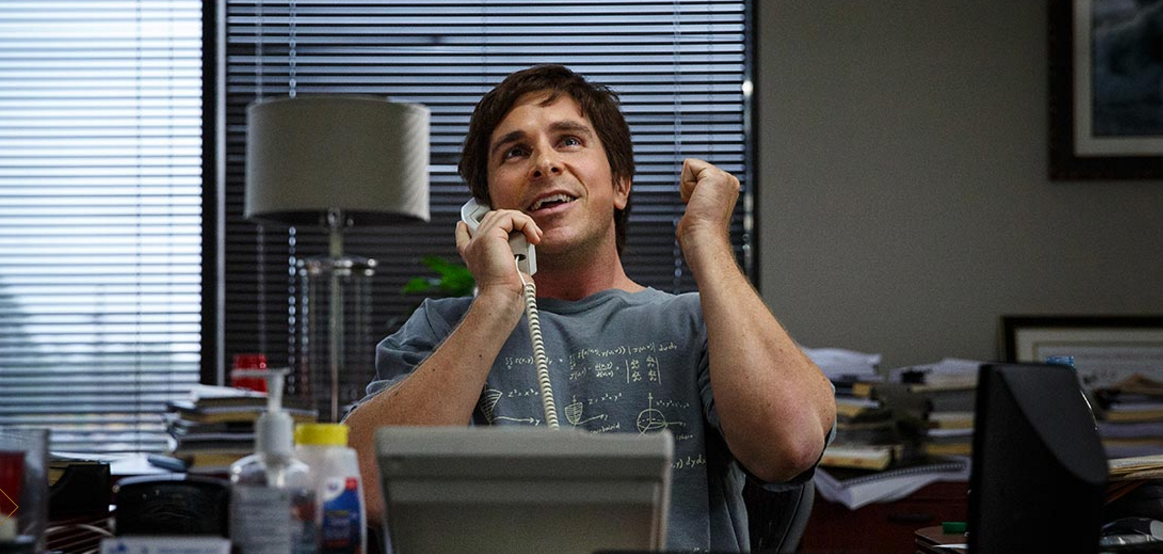Well, it’s happened. The man most famous for being a frequent Will Ferrell collaborator, Adam McKay, has made (arguably) the smartest movie of 2015. The Big Short is a derisive satire based on the 2010 best-selling non-fiction book of the same name, focusing on a handful of key players on Wall Street and across the country who not only predicted the inevitable housing crisis of 2008, but looked to capitalize on the looming crash quite handsomely.
McKay and Charles Randolph adapted the screenplay from the Michael Lewis’ book that chronicles the real life series of events that lead to a respective group of money managers (Steve Carell and his motley crew), investors (Christian Bale and Brad Pitt), and Wall Street types (Ryan Gosling) who looked to bet against the wildly profitable sub-prime mortgage industry. Seems like a tough sell, right? A movie that revolves around a bunch of rich white guys in their offices outsmarting all the other rich white guys sounds hardly interesting, or original (see: Gordon Gecko). That’s where the combination of McKay’s comedic prowess and ingénue along with the A-list arsenal of acting immersion lift The Big Short into unparalleled satirical standing.
The Big Short is grimly funny – opening with an uncanny (and later on, intermittent) fourth-wall break a la Wolf Of Wall Street from Ryan Gosling, whoops, in the movie he’s Jared Vennett, a hotshot Deutsche banker. Vennett takes the viewer through a brief montage on the history of the real estate, mortgage, and various other large-scale financial industries in a fun and expository manner. Despite the light and playful nature of Vennett’s historical run down, the overall sardonic tone is established, allowing the film to become much darker and fuel itself with clever wit and rage.
The players introduced in Vennett’s expository homily are as follows: all around acting chameleon Christian Bale as the glass-eyed, hermitic M.D. turned San Jose investing consultant with a penchant for drumming, Michael Burry, Steve Carell as the New York corporation-condemning neurotic misanthrope Michael Baum and his troupe of equally maladjusted money managers (one of the films truly unexpected highlights) portrayed by Hamish Linklater, Rafe Spall, and Jeremy Strong. Brad Pitt not only stars as Ben Rickert, a despondent Wall Street banker turned political activist/guiding light to a couple young gunners from Denver (Finn Wittrock and John Magaro), but also lends a hand as a producer on the film. Finally, the film’s pseudo narrator, docent, fit fanatic, Jordan Belfort-lite, antagonistic protagonist, resident “burn” distributor, Jared Vennett, played by Ryan Gosling in a jerry curl.
Due to the magnificent People magazine fodder the exceptional cast actually is, the film takes a couple beats to fully commit to the characters within the story. That being said, Bale disappears into Burry’s anti-social, atypical nature seamlessly almost instantaneously, with Carell’s well-intentioned, yet cynical portrayal of Michael Baum not far behind.
Rather than give a full recount of the film’s synopsis, the reader may be better served with focuses on the unique and clever aspects of the film instead. The film operates in multiple parts - documentary, farce, drama, satire, etc. – with each aspect being highlighted in various capacities. Gosling’s Vennett serves as a wonderful narrator for the more historical, expository asides, while Carell and Bale offer more dramatic performances within the film. Pitt’s role in the film is mostly ancillary, but provides a lens that inevitably makes the viewer question the protagonists’ moral standing as a whole.
The A-list cast certainly carries the film, but perhaps the most notable aspect of the film as a whole is the manner of which complex real estate and mortgage terms are explained in layman’s terms by the likes of Margot Robbie, Anthony Bourdain, Richard Thaler, and Selena Gomez. When key terms and complex mortgage phrases are introduced, Gosling inevitably throws a quick cut to a cameo. Each cameo is essentially an informational vignette that gives both a humorous and informative explanation of the term. Again, instead of reproducing each individual informative vignette, just know that one involves Margot Robbie in a bathtub (eerily similar to Wolf of Wall Street), Anthony Bourdain in a kitchen, and arguably the best of the three, economist Richard Thaler and pop star Selena Gomez explaining synthetic CDO’s (Collateralized Debt Obligations) and the “Hot Hand Fallacy” over a game of blackjack.
The Big Short is the smartest movie in 2015. It’s sharp, divisive, engaging, and humorous, without sacrificing any ounce of information in the name of Hollywood dramatics. It is a movie that focuses on subprime loans, something so complex, even the banks that doled them out failed to fully grasp exactly what they entailed. McKay manages to take a bewildering piece in history and craft it into a digestible package that does not sacrifice any wit or edge so audiences can understand more clearly. The Big Short observes and utilizes the events (24-hour celebrity news cycle) that obfuscated the eventual recession, and in turn illuminates the situation so viewers can make their own decisions on what went wrong, and who (if anyone) is to blame.


